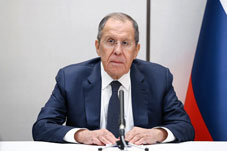
Lavrov Invites Georgia to Rejoin 3+3 Platform Amid Regional Security Concerns
By Liza Mchedlidze
Monday, October 21, 2024
Following the 3+3 Regional Platform meeting in Istanbul on October 18, Russian Foreign Minister Sergey Lavrov emphasized Russia's openness to Georgia's participation, stating, "The chair and the door are always open for them," and added, "As soon as Tbilisi decides, they can come and sit in their chair at any time."
When asked if he regretted Georgia's absence from the meeting, which he characterized as a missed opportunity for "almost direct Russian-Georgian contacts," Lavrov highlighted existing diplomatic channels. "We have contacts with Tbilisi; there is a Section of Russian Federation Interests at the Embassy of the Swiss Confederation in Georgia. Our diplomats work there," he explained. He noted that they have the opportunity to discuss current issues with relevant Georgian authorities, primarily focusing on trade, tourism, and people-to-people contacts.
The 3+3 format, established in 2021 following the 2020 Karabakh war, brings together three regional powers-Iran, Turkey, and Russia-along with two South Caucasus countries, Azerbaijan and Armenia. Notably, Georgia is not a member of this platform.
Lavrov reiterated that during the 3+3 format meeting, they confirmed that "the doors of this platform always remain open for Georgia," expressing hope that over time, Georgian neighbors will join its work.
On the topic of regional security threats, Lavrov echoed narratives from the ruling Georgian Dream party, claiming that "one of the serious problems is the well-known attempts by the West to open a 'second' front against Russia." He alleged that these efforts aim to destabilize situations in Abkhazia and South Ossetia.
The Russian Foreign Minister also accused "extra-regional players" of trying to "dictate their own terms" in the South Caucasus, asserting that such actions threaten the interests of regional countries. He illustrated his point by referencing the recent Georgian government's passage of the foreign agents law, stating that "the EU immediately declared" Georgia was "no longer considered a priority partner for EU accession talks because it had violated 'European values.'"
Lavrov concluded by criticizing what he termed the West's attempts to maximize its influence in the region, which he argued undermines opportunities for equal and mutually beneficial cooperation between South Caucasus countries and Russia. He claimed that if "European values" include funding subversion and promoting the LGBT agenda, then it reflects poorly on those advocating for such values.

